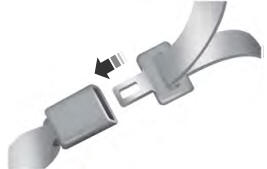Ford Explorer: Body Repairs - General Information / Description and Operation - Impact of Insufficient Repair Quality
Body repairs usually require a significant level of intervention in the existing body shell structure. The corrosion protection, seals and NVH components are destroyed and must be replaced.
To prevent the vehicle quality from being compromised due to a poor quality repair, all repairs must be inspected during and after the accident repair.
NOTE: Logs of the acceptance of individual operations are a useful tool for quality assurance. A comprehensive final inspection should be carried out.
In the process, the entire repair sequence must be split into meaningful sections, with the creation of check points to which particular attention must be paid.
The following are some recommended checkpoints sequences:
- During and after body work.
- Final assembly, ancillary components, functional tests.
- Vehicle delivery.
After completion of the body repairs, the following areas should be checked:
- Inspection for functionality of mechanical and electrical components.
- Vehicle must be restored to pre-accident manufacturers design condition.
- Check fit of all body panels, weld and screw connections
- Check fit of ancillary components such as doors and hood.
- Inspect the integrity of all bonded/riveted seams.
- Inspect the quality of welded seams.
- Check seals, plugs and NVH components.
- Corrosion protection must be restored to pre-accident level.
- Check that the vehicle is in correct condition for painting.
After final assembly, a visual inspection and functional inspection is required.
- Check repair area for flaws in paint or incorrect fit of body panels.
- Check installation of all trim components for gaps, rattles or poor alignment and fit.
- Check operation of mechanical components such as door glass and seat operation.
- Check operation of electrical components such as roof opening panel, door locks and audio systems.
- Check for air or water leaks in repaired area.
To ensure a quality repair, perform a pre-delivery vehicle inspection.
- Check corrosion protection, sound damping matting and rubber seals.
- Check paint for overspray, runs, drips and sags.
- Check the cleanliness of the vehicle.
- Perform functional check of the mechanical and electrical components.
- Road test the vehicle.
- Check for squeaks and rattles.
- Check for wind noises and water leaks.
 Description and Operation - Complete Panel Replacement/Partial Replacement
Description and Operation - Complete Panel Replacement/Partial Replacement
Partial Replacement
Item
Description
1
Sectioning area
2
Manufacture weld joint
Decision Criteria
The following ..
 Description and Operation - Plastic Repairs
Description and Operation - Plastic Repairs
Plastic Components
The
following illustration(s) are not all-inclusive of trim levels
available. The actual trim level of the vehicle will determine the
viability of carrying out a plastics re..
Other information:
Ford Explorer 2020-2026 Owners Manual: Waxing
Regular waxing is necessary to protect your car's paint from the elements. We recommend that you wash and wax the painted surface once or twice a year. When washing and waxing, park your vehicle in a shaded area out of direct sunlight. Always wash your vehicle before applying wax...
Ford Explorer 2020-2026 Owners Manual: General Information
WARNING: Driving while distracted can result in loss of vehicle control, crash and injury. We strongly recommend that you use extreme caution when using any device that may take your focus off the road. Your primary responsibility is the safe operation of your vehicle...
Categories
- Manuals Home
- 6th Generation Explorer Owners Manual
- 6th Generation Explorer Service Manual
- Engine
- General Procedures - Rear Camber Adjustment
- Engine - 2.3L EcoBoost (201kW/273PS)
- New on site
- Most important about car
Fastening the Seatbelts
The front outboard and rear safety restraints in the vehicle are combination lap and shoulder belts.

